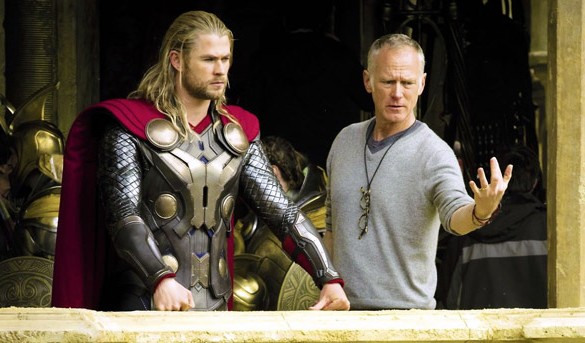

So, by now you’ve no doubt seen Thor: The Dark World. And it’s probably a fair guess to assume you agree with us that it’s great! Last week, in advance of the film’s release, we published interviews with the film’s stars, Chris Hemsworth and Tom Hiddleston, as well as Marvel boss, Kevin Feige. Today, rounding off our Thor: The Dark World coverage is an interview with the film’s director, Alan Taylor. Where we discuss the tone of the film, the contrast between working on a movie like this and working on a big budget TV show like Game of Thrones, and his thoughts on the property destruction and po-faced seriousness in some other superhero movies.
On the Tone of the Film
“It’s funny, it’s such a balancing act in the Marvel movies. I came in very conscious of wanting to change what I saw in the first movie, at least in terms of the style of shooting and tone, I had this idea I was going to darken it up and dirty it up and make it look ‘real’. I came in prepared to fight that battle and get resistance, and there was no resistance. So almost immediately I jumped to the other side and thought, ‘oh God, if I’m making it this dark’ – and I was seeing Avengers come out and my daughters were laughing their heads off at it, and I realised it’s crucial to be funny in the Marvel universe. And I saw a couple of big movies made by other studios at the same time, that didn’t have that array of tones, and felt like they were lacking something once you get used to it. So yeah, from that point on it became, ‘yeah we’re going to kill this person and that will be terrible, then we’re going to do this, which will be ridiculous and funny. Trying to find that balance was a constant struggle.”
On Property Destruction and the Man of Steel


The practical differences between a summer blockbuster and filming a big budget TV show
“That strange alchemy. There’s never enough money, there’s never enough time, and it was palpable on this thing. On Game of Thrones we go to Iceland, and we shoot for a few weeks, and we have extras and we do everything. It was very important for me to take this movie to Iceland, so we could do it in a different landscape, but have a real landscape. But by the time we actually got there, we were spending so much money by going there, that we could only be there for a few days. On Game of Thrones I hold my own monitor, there’s one assistant who takes care of everybody, you share vehicles up and down, you sleep in a not-very-fancy hotel room, in a sleeping bag frequently. On this film it’s like we airlifted Shepperton over. I remember seeing a helicopter going over while we were shooting, and it was bringing lunch to the second unit. Bring a granola bar. We got there, and there was the biggest base camp I’d ever seen in my entire life, and that was the basecamp at the bottom of the mountain. Then the real base camp is up there, and literally everything you could possibly want is provided. But as a result, you couldn’t afford to do anything. It’s a different scale of movie. It’s like a guerrilla operation versus a major military operation.”
The similarities between the two
“I didn’t feel too constrained by that, because – no I couldn’t kill Thor, because he’s going to be necessary in Avengers, [but] we did get to kill people. It’s not like the parameters that were coming down from on high were that confining. The constraints are more like time. It’s always essentially the same. I made a movie for no money, it shot in 12 days, and I thought, ‘gee, we have no money and no time’, then I did something over six months with multi-multi-millions of dollars, and had no time, and had no money. Confusing.”
On the possibility of him working with Marvel again in the future
“I’m not sure what’s going to happen next. There are rumours about me doing a movie from somewhere else… I would like to cross back and forth between TV and movies. I do think my restlessness will continue. I would love to – at this point I’m hungry for something small. The [Terminator movie] is not a good solution for that”
On his rumoured involvement with the next Terminator film
“I don’t know where it came from, because I had one meeting and it’s all over the internet”.
—————–









